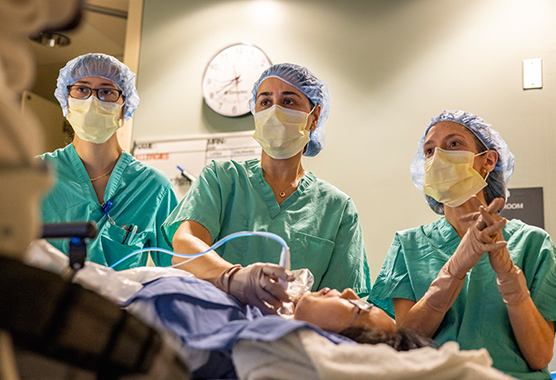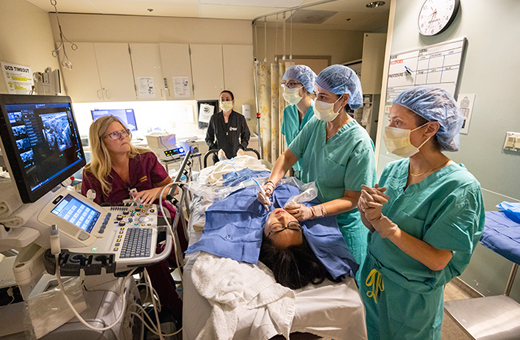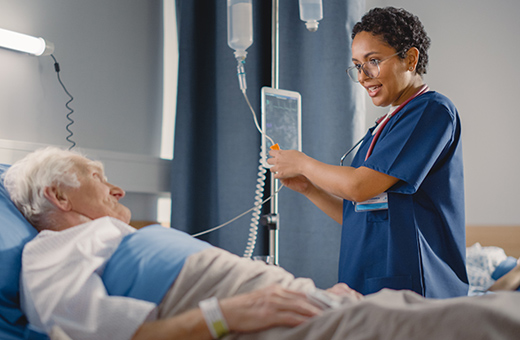Thyroid Nodule Ablation
Minimally invasive thyroid therapies shrink or eliminate benign thyroid nodules, allowing you to enjoy life with reduced symptoms and no scarring.
Medically reviewed by Claire Graves, M.D. on Jan. 30, 2025.

Innovative Leaders in Thyroid Care
We combine the expertise of endocrine surgery and radiology to bring you the best thyroid care available. You can trust our compassionate specialists to relieve symptoms including discomfort and pressure, difficulty swallowing, and voice changes related to an enlarged thyroid. Thyroid ablation can also treat hyperthyroidism, often allowing you to come off medications that suppress thyroid hormone.
Our providers were among the first in California to offer radiofrequency ablation for thyroid nodules (lumps). We offer safe, minimally invasive procedures when thyroid conditions become problematic. Minimally invasive approaches can reduce pain and scarring and help you recover faster.
Our team is committed to advancing your quality of life with thyroid conditions through research and innovation. We strive to bring you the most effective therapies that keep your endocrine system working at its best — and get you back to feeling like yourself.
Types of Thyroid Nodule Ablation
Thyroid nodule ablation is a nonsurgical procedure that works to treat thyroid conditions and reduce your symptoms. We offer ablation as a minimally invasive alternative to surgery when possible for:
- Thyroid nodules that cause symptoms due to their size
- Functional or “toxic” thyroid adenomas (a thyroid nodule causing hyperthyroidism)
Ablation therapies allow you to recover quickly and do not leave a scar on your neck. They can also reduce the need for hormone replacement therapy due to complete removal of the gland.
We use several types of thyroid ablation treatment in the UC Davis Center for Interventional Thyroidology and Division of Nuclear Medicine, including:
Ethanol Ablation
We use ultrasound-guided ethanol ablation to treat benign thyroid nodules that are made up mostly of fluid, known as cystic nodules. The procedure involves removing the liquid from the cystic nodule. We then place ethanol (alcohol) into the nodule through a needle.
The ethanol causes scar tissue to form within the nodule, preventing the nodule from refilling with fluid. You may need more than one procedure if fluid comes back over time.
Thyroid Radiofrequency Ablation (RFA)
Thyroid radiofrequency ablation (or thyroid RFA) works by destroying cells inside a thyroid nodule with heat. Our providers use a thin probe to target the nodule through the skin. After the procedure, the thyroid nodule shrinks over time.
Radioactive Iodine Ablation
Our nuclear medicine specialists offer radioactive iodine (radioiodine) ablation. The therapy involves ingesting small doses of radioactive iodine, which the thyroid absorbs. The radioactive iodine destroys thyroid cancer cells or overactive cells. The gland shrinks without harming other cells in the body.
Request an Appointment
As Sacramento's No. 1 hospital, you'll benefit from unique advantages in primary care and specialty care. This includes prevention, diagnosis and treatment options from experts in 150 specialties.
Referring Physicians
To refer a patient, submit an electronic referral form or call.
800-4-UCDAVIS
Patients
Call to make an appointment.
Consumer Resource Center
800-2-UCDAVIS
We do thyroid nodule ablation procedures in our outpatient clinics. These minimally invasive, nonsurgical therapies are generally safer than thyroid surgery and allow you to have a fast recovery.
-

Before Thyroid Nodule Ablation
We do several diagnostic tests and meet with you to discuss your treatment options before proceeding with thyroid ablation. Your endocrine surgeon will give you detailed instructions on how to prepare for the procedure.
-

During Thyroid Nodule Ablation
You will be awake during the procedure, but don’t worry. You have no sensory feeling in your thyroid, and we numb the throat area using local anesthesia to block pain. Your surgeon does the procedure under ultrasound imaging guidance, which helps us deliver precise treatment. Thyroid ablation usually takes 30 minutes to one hour, depending on the procedure.
-

Recovery From Thyroid Nodule Ablation
You can go home a couple of hours after a thyroid nodule ablation procedure. Our team monitors you in a recovery room as the local anesthesia wears off. Most people return to work and their daily activities within one to two days. We schedule a follow-up appointment with you and will do future ultrasounds to monitor your thyroid health.
Thyroid Nodule Ablation Side Effects
Side effects of thyroid nodule ablation tend to go away within days after the procedure. Different therapies cause different side effects, but people most commonly experience:
Mild Pain
You may have pain, discomfort or bruising on your neck where the needle or probe was inserted. Some therapies can also cause a sore throat or coughing.
Nausea
Some people experience nausea after ablation procedures. Your provider may recommend medication to help until your symptoms improve.
Swelling
Thyroid ablation can cause inflammation and tenderness in your neck. Typically, the swelling is mild.
When to Contact Your Surgeon
Contact a member of your care team if you experience unusual symptoms after thyroid ablation, such as lasting pain, vomiting or extreme swelling.

Ranked among the nation’s best hospitals
A U.S. News & World Report best hospital in cardiology, heart & vascular surgery, diabetes & endocrinology, ENT, geriatrics, neurology & neurosurgery, and pulmonology & lung surgery.

Ranked among the nation’s best children’s hospitals
U.S. News & World Report ranked UC Davis Children’s Hospital among the best in pediatric nephrology, orthopedics*, and pulmonology & lung surgery. (*Together with Shriners Children’s Northern California)

Ranked Sacramento’s #1 hospital
Ranked Sacramento’s #1 hospital by U.S. News, and high-performing in aortic valve surgery, back surgery (spinal fusion), COPD, colon cancer surgery, diabetes, gynecological cancer surgery, heart arrhythmia, heart failure, kidney failure, leukemia, lymphoma & myeloma, lung cancer surgery, pacemaker implantation, pneumonia, prostate cancer surgery, stroke, TAVR, cancer, orthopedics, gastroenterology & GI surgery, and urology.

The nation’s highest nursing honor
UC Davis Medical Center has received Magnet® recognition, the nation’s highest honor for nursing excellence.

World-class cancer care
One of ~59 U.S. cancer centers designated “comprehensive” by the National Cancer Institute.

A leader in health care equality
For the 13th consecutive year, UC Davis Medical Center has been recognized as an LGBTQ+ Healthcare Equality Leader by the educational arm of America’s largest civil rights organization.

